A leading credit rating agency has blamed the Andrews Government’s prolonged lockdowns for Victoria’s ballooning debt, as the state stares down the prospect of a credit rating downgrade – meaning an increased risk of defaulting on debt i.e., bankruptcy – within the next year.
Victoria’s capital, Melbourne, had the longest lockdowns in the world – six lockdowns with a cumulative total of 262 days throughout 2020 and 2021, during which time many businesses were shuttered while workers lived off benefits.
Anthony Walker, Director in the sovereign ratings team at S&P Global Ratings, said that only five or six years ago, “Victoria had the best financial outcomes” in Australia, but that the Andrews Government’s lockdowns had created fiscal conditions that Walker described matter-of-factly as “not positive”.
“Definitely the prolonged lockdowns and the number of lockdowns during Covid were the key that drove this,” Walker told Tom Elliot on 3AW radio.
“What we’re seeing now is that most other states around the world have recovered from Covid financially. Australian states, not just Victoria, are lagging.
“Our understanding was that the Government didn’t really care about the financial, economic costs.
“They just wanted to get the health outcomes correct. Well, that came at a massive fiscal shock, and they’re still trying to recover from that.”
Walker said that “very difficult decisions need to be made” about Government spending going forward, as a looming credit rating downgrade would direct more state funds towards paying off higher interest fees on debt, potentially sending social welfare programs or infrastructure projects to the chopping block.
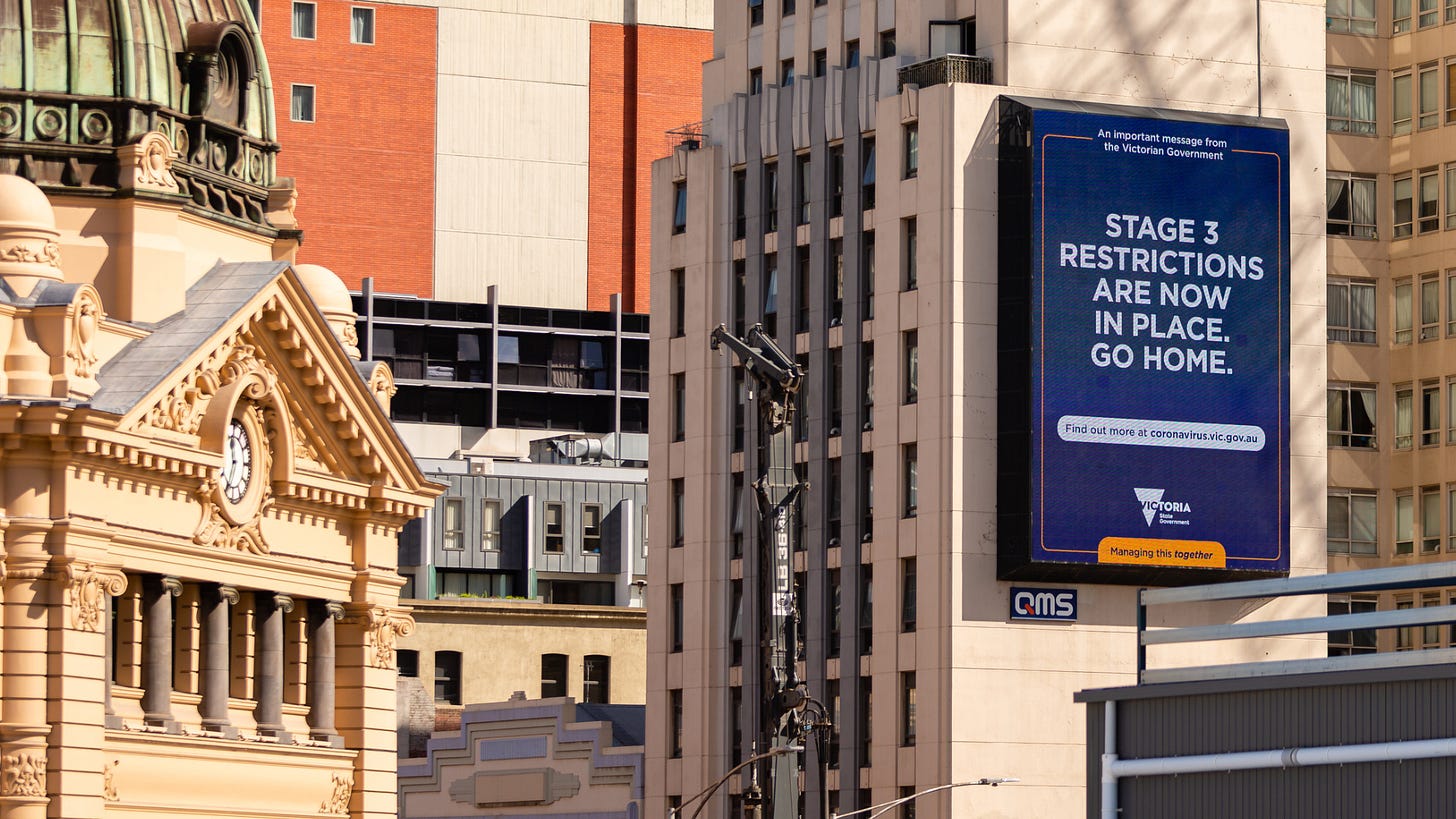
Walker’s comments come as Victoria is currently paying $26 million Australian dollars a day – $9.4 billion per year – on interest repayments towards the state’s $156.2 billion debt, projected to rise to $187.8 billion by 2027-28, for a population of approximately seven million. Victoria’s net debt is projected to be 24.4% of gross state product (GSP, which calculates the value of goods and services produced by the state) by June 2025.
Walker said that budget blow outs and funding shortfalls on several large infrastructure projects could create further downward pressure on Victoria’s credit rating.
The Airport Rail Link is projected to blow out by $2 billion due to delays, and the Metro Tunnel project has been beset by problems contributing to around $3 billion in added costs. A third project, the Suburban Rail Loop, is facing a $20 billion funding gap.
Victoria’s credit rating was already dropped by two levels – from AAA to AA – in 2020, a move that Walker said had never been done before for a state government.
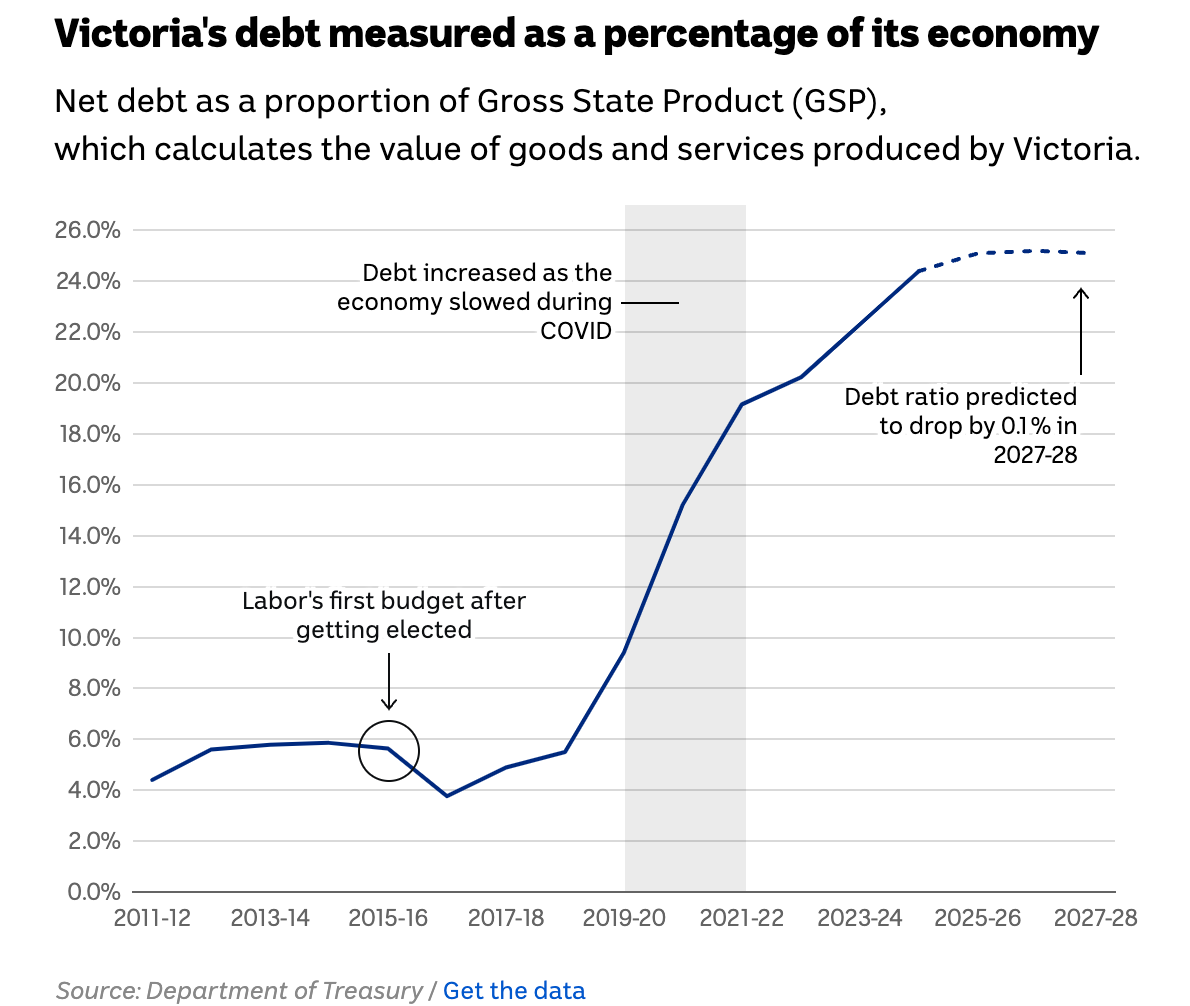
Economist: Worst peace-time policy failure
Professor Gigi Foster, an economist at the University of New South Wales (UNSW) said it was clear since as early as March 2020 that Victoria’s lockdowns would carry enormous economic costs.
“I am sorry to say that I stand by my predictions that Covid lockdowns will go down eventually as the worst peace-time policy failure in Australia’s history,” Foster told me.
“There is no world in which forcing an economy to pause indefinitely carries no cost, because economic activity is the engine that powers the maintenance and gradual rise of human living standards.”
Foster cautioned a Victorian Government committee in August 2020 that continued lockdowns would cause greater loss of life years and wellbeing than they would save, but “sadly, my warnings went unheeded”.
Instead, Foster was singled out for abuse for highlighting the potential harms of Victoria’s extreme lockdown policies.
“I was pilloried by others in my profession, called many derogatory names by dozens of people over email, on social media, and in studio audiences, and told many times that my professional opinion about lockdown policies was of no value (or was even ‘dangerous to public health’) because I was not a health practitioner or epidemiologist,” she said.
Foster’s analysis of the societal, economic and health merits of Victoria’s Covid lockdowns found that the costs were 68 times greater than any benefits afforded.
Foster has also co-authored a book-length cost-benefit analysis of Victoria’s lockdowns with ex-Victorian Treasury economist Sanjeev Sabhlok, and a peer-reviewed paper with economist Paul Frijters in which the authors conclude that Australia’s lockdowns were “a disproportionate and largely ineffective policy response” to Covid, which went against decades of scientific consensus.

Epidemiologist: Harm the economy, harm human health
Stanford University epidemiologist Professor Jay Bhattacharya also faced blowback for his warnings about the harms of lockdowns, being targeted by the National Institutes of Health (NIH) Director Francis Collins for a “quick and devastating published take down” of his views, and being censored by social media platforms under pressure from the Biden Administration.
Bhattacharya told me that criticisms of lockdowns were wrongly seen in terms of a trade-off between saving lives and protecting the economy.
“In fact, there was no trade-off as the lockdowns did not ultimately protect human life, and they devastated the economies of the countries that most assiduously implemented them,” he said.
“A second related fallacy is the idea that economic harm does not translate to harm to human health. The opposite is true.
“Poorer populations lead shorter, less healthy lives. Accounting for economic harm should be a vital part of public health thinking, even during a pandemic, if human life is to be preserved.”
In October 2020, Bhattacharya co-authored the Great Barrington Declaration with epidemiologists Martin Kulldorff (Harvard) and Sunetra Gupta (Oxford), calling for ‘focused protection’ of the most vulnerable instead of wholesale lockdowns. This approach is now widely agreed to be the least damaging and the most effective.
But Bhattacharya said that Australian media, with the exception of Spectator and Outsiders on Sky News, were “quite hostile” to this idea during the peak days of the pandemic in 2020-2022.
“The point of view adopted by much of the Australian press seemed to be that zero-Covid was a permanent achievable goal, with no regard for the ultimate futility of the strategy and the harms to health and welfare imposed on the Australian population by the policy.”
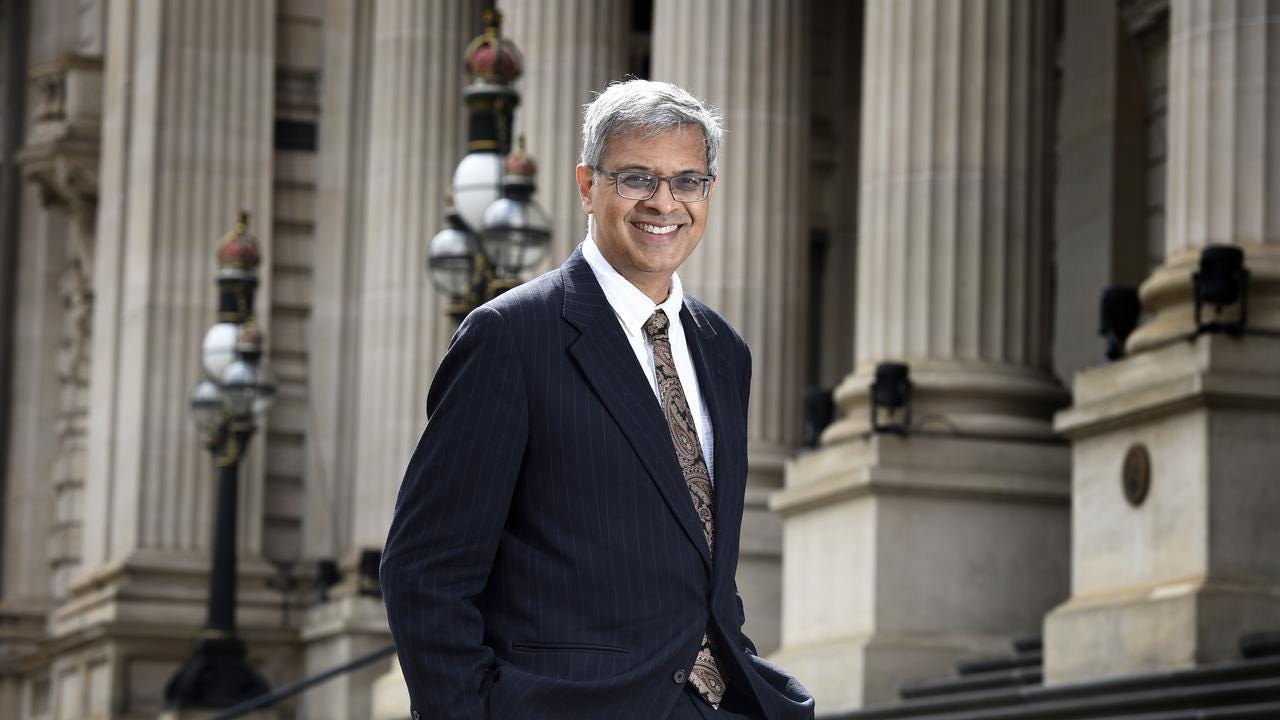
Victorian Government: Economic growth is what matters
A spokesperson for the Victorian Government said:
At the height of the pandemic we used our balance sheet to protect families and businesses, savings jobs and saving lives, and since September 2020 we have led the nation in jobs growth.
Our fiscal strategy is strengthening the economy and providing opportunities for Victorians, with more jobs created in Victoria than any other state since we came to government.
Deloitte Access Economics data forecasts that Victoria will lead the nation in economic growth over the next five years.
The spokesperson added that the Victorian Budget 2024/25 is “the first time net debt to GSP has dropped since 2017”.
Foster is sceptical. “If you actively damage the economy, lowering the baseline of activity and jobs, then it’s a lot easier to create growth in both from that lower baseline and then crow about it,” she said.
Former Premier Dan Andrews, who was responsible for Victoria’s Covid lockdowns, has not publicly commented on Walker’s statements blaming his policies for the state’s dire debt situation.
However, when previously challenged on his draconian Covid policies, Andrews has tended towards defending his record, highlighting that he was re-elected in 2022 after the worst of the lockdowns, and refusing to “apologise for saving lives”.
Nearly three quarters of Victorians supported the Andrews Government’s extreme measures in the first year of the pandemic, polling showed.
This year, Andrews was awarded Australia’s top honour, in part for “eminent service to public health”.
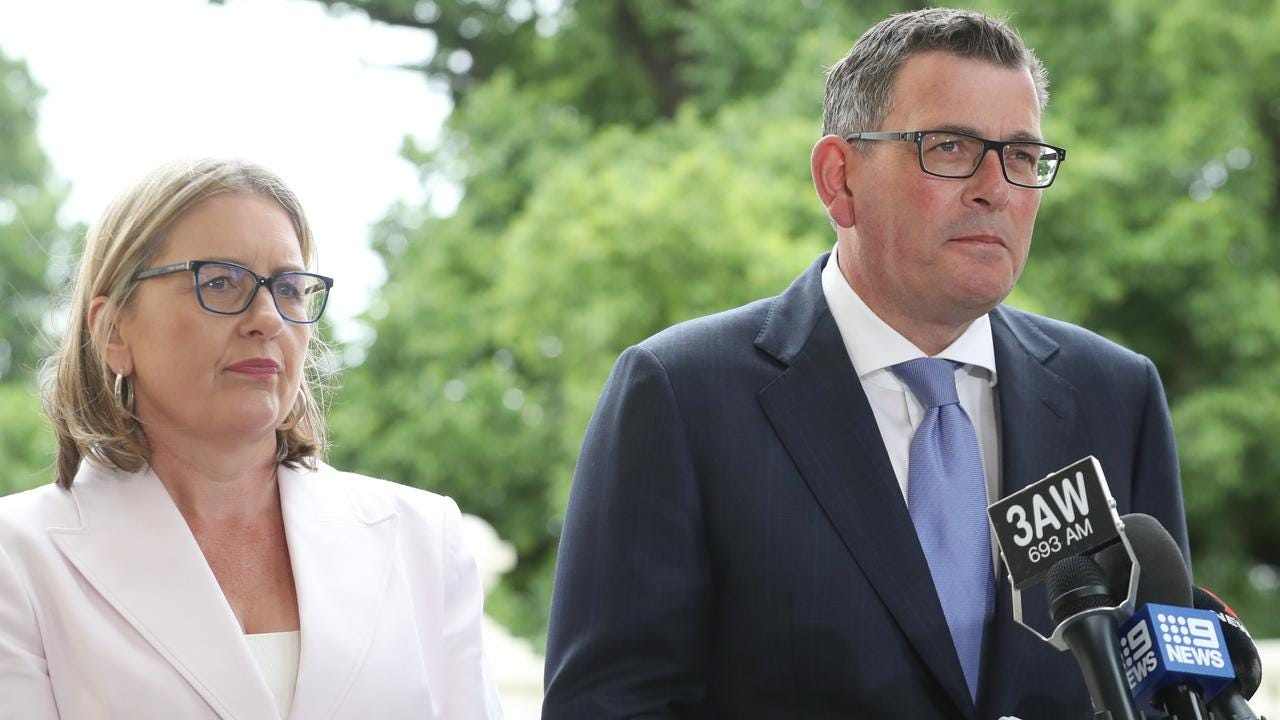
Looking ahead
Foster said she is concerned that Victoria’s debt woes are “only the tip of the iceberg”.
“Far more negative effects on Australia’s health, wealth and happiness will be seen in the coming years stemming directly from our colossal mismanagement of the Covid era.”
But it’s not all bad news – there are things that can be done to improve the situation, said Foster.
“The Government should significantly reduce its own numbers and its own pay cheques, reduce red tape in industries across the board, refocus on its core mission of providing high-quality, easily accessible basic services and public goods to all Victorians, [and] open all state affairs to public scrutiny.”
The Government should also set up a process to “manage the acknowledgement of betrayal, hearing of pain, apologies, trials, and other components the people of the state will need to heal” from pandemic mismanagement, she said.
With the Covid pandemic in the rearview mirror, much of the focus is now on lessons learned.
Asked what we can learn from Victoria’s pandemic management, and lockdowns in particular, Bhattacharya is frank.
“Victoria is an example of how not to handle a pandemic. Authoritarian government is bad public health policy.”
This article was originally published on Dystopian Down Under, Rebekah Barnettt’s Substack newsletter. You can subscribe here.
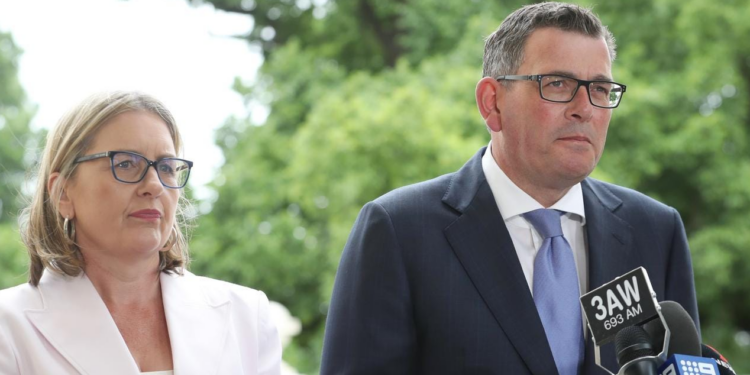












To join in with the discussion please make a donation to The Daily Sceptic.
Profanity and abuse will be removed and may lead to a permanent ban.
People in positions of power seem to like to say ‘no’. Its as if this is the mark of their ability to make ‘difficult decisions’, like responsible grown ups would, to minimise risk and keep everyone ‘safe’. ‘No-one is safe until everyone is safe’ wasn’t it..? What they forgot was that the 98% of people who were already safe, were being harmed the longer it went on. A ‘virtuous folly’, in any terms.
Shutting down the economy and printing money will have lasting negative effects – who knew? Another “conspiracy theory” come true.
Andrews is no doubt delighted by this appraisal because he has achieved just what the Davos Deviants ordered – wholesale economic destruction across Western nations. In the UK the con Tories made such a shambles of the job that Kneel was ordered to take over and properly destroy the country and his enthusiasm for the task is a wonder to behold.
The C1984 lockdowns and furlough schemes were never about saving lives and economies but about killing people and making them poorly both physically and financially. It has so far worked and will undoubtedly show “improved” results as the months and years pass. In fact so successful was the original response to the pandemic that never was that it is highly likely they will try it again.
They just wanted to get the health outcomes correct.
How often have we heard that lie? He was taking orders and was one of the worst dictators enforcing the policies that claimed literally millions of lives, as well as enforcing vaccination with poisonous products which also cost millions of lives.
When do the Covid-equivalent Nuremberg trials begin, as if I did not know? (Never.)
Chickens coming home …
Shame.
These two comments say it all, the whole Covid fiasco [which was fought against by this website since March 2020]
“..our colossal mismanagement of the Covid era”
“Authoritarian government is bad public health policy.”
Whoever knew………….
It’s also a bad way to run energy policy. Tooth fairies have a habit of not turning up when the hat is handed around…
The Tall Poppies got what they voted for. What would Crocodile Dundee think of the Covid scam!
Dan Andrews boiled our pizz big time ! He was unreal !! However we now have our very own Dan in Stier Karmer !!

“Dictator Dan Andrews’s Victoria Facing Increased Risk of Bankruptcy Due to Lockdowns, Says Credit Rating Agency”
I guess this is why the clever people at this (or any other) Credit Rating Agency must be paid shed loads of money to come to this conclusion in under 5 years. What a complete surprise as I thought (was told) all the lockdowns were a great idea – things like; stop the economy to save the publicly funded Health Service. I have no economic qualifications, or any management or political qualifications, or medical qualifications, or virology qualifications which probably explains why I was very wrong to think that I (and many other ‘unqualifieds’) could foresee what was going to happen right at the point all the various ‘measures’ were announced and described.
“In October 2020, Bhattacharya co-authored the Great Barrington Declaration with epidemiologists Martin Kulldorff (Harvard) and Sunetra Gupta (Oxford), calling for ‘focused protection’ of the most vulnerable instead of wholesale lockdowns.”
In other words a standard western medical response that has been developed over 160 years.
Here is an extract from Factfullness by Hans Rosling and the dangers of the Urgency Instinct. This is about not doing lockdowns.
Chapter 10 – The Urgency Instinct
“If it’s not contagious, then why did you evacuate your children and wife?” asked the mayor of Nacala, eyeing me from a safe distance behind his desk. Out the window, a breath-taking sun was setting over Nacala district and its population of hundreds of thousands of extremely poor people, served by just one doctor – me.
Earlier in the day I had arrived back in the city from a poor coastal area in the north named Memba. There I had spent two days using my hands to diagnose hundreds of patients with a terrible, unexplained disease that had completely paralyzed their legs within minutes of onset and, in severe cases, made them blind. And the mayor was right; I wasn’t 100% sure it was not contagious. I hadn’t slept the previous night but had stayed up, pouring over my medical textbook, until I had finally concluded that the symptoms I was seeing had not been described before. I’d guessed this was some kind of poison rather than anything infectious, but I couldn’t be sure, and I had asked my wife to take our young children and leave the district.
Before I could figure out what to say, the mayor said, “If you think it could be contagious, I must do something. To avoid a catastrophe, I must stop the disease from reaching the city.”
The worst-case scenario had already unfolded in the mayor’s mind, and immediately spread to mine.
The mayor was a man of action. He stood up and said, “Should I tell the military to set up a roadblock and stop the buses from the north?”
“Yes,” I said. “I think it’s a good idea. You have to do something.”
The mayor disappeared to make some calls.
When the sun rose over Memba the next morning, some 20 women and their youngest children were already up, waiting for the morning bus to take them to the market in Nacala to sell their goods. When they learned the bus had been cancelled, they walked down to the beach and asked the fishermen to take them by the sea route instead. The fishermen made room for everyone in their small boats, probably happy to be making the easiest money of their lives as they sailed south along the coast.
Nobody could swim and when the boats capsized in the waves, all the mothers and children and fishermen drowned.
That afternoon I headed north again, past the roadblock, to continue to investigate the strange disease. As I drove through Memba I came across a group of people lining up on the roadside dead bodies they had pulled out of the sea. I ran down to the beach but it was too late. I asked a man carrying the body of a young boy, “Why were all these children and mothers out in those fragile boats?”
“There was no bus this morning.” he said. Several minutes later I could not still barely understand what I had done. Still today I can’t forgive myself. Why did I have to say to the mayor, “You must do something”?
I couldn’t blame these tragic deaths on the fisherman. Desperate people who need to get to market of course take the boat when the city authorities for some reason block the road.
I have no way to tell you how I carried on with the work I had to do that day and in the days afterward. And I didn’t talk about this to anyone else for 35 years.
Fourteen years later, in 1995, the ministers in Kinshasa, the capital of DR Congo, heard that there was an Ebola outbreak in the city of Kitwik. They got scared. They felt they had to do something. They set up a roadblock. Again, there were unintended consequences. Feeding the people in the capital became a major problem because the rural area that had always supplied most of their processed cassava was on the other side of the disease-stricken area. The city was hungry and started buying all it could from it’s second largest food producing area. Prices skyrocketed, and guess what? A mysterious outbreak of paralyzed legs and blindness followed.
Nineteen years after that, in 2014, there was an outbreak of Ebola in the rural north of Liberia. Inexperienced people from rich countries got scared and they all came up with the same idea: a roadblock!
At the Ministry of Health, I encountered politicians of a higher quality. They were more experienced, and their experience made them cautious. Their main concern was that roadblocks would destroy the trust of the people abandoned behind them. This would have been absolutely catastrophic: Ebola outbreaks are defeated by contact tracers, who depend on people honestly disclosing everybody they have touched. These heroes were sitting in poor slum dwellings carefully interviewing people who had just lost a family member about every individual their loved one might have infected before dying. Often, of course, the person being interviewed was on that list and potentially infected. Despite the constant fear and wave after wave of rumors, there was no room for drastic, panicky action. The infection path could not be traced with brute force, just patient, calm, meticulous work. One single individually delicately leaving out information about his dead brother’s multiple lovers could cost a thousand lives.
When we are afraid and under time pressure and thinking of worst-case scenarios, we tend to make really stupid decisions. Our ability to think analytically can be overwhelmed my an urge to make quick decisions and take immediate action.
Back in Nacala in 1981, I spent several days carefully investigating the disease but less than a minute thinking about the consequences of closing the road. Urgency, fear and a single-minded focus on the risks of a pandemic shut down my ability to think things through. In the rush to do something, I did something terrible.
A very powerful piece. Should be read by all public health officials and politicians.
‘ “They just wanted to get the health outcomes correct….’
They could have achieved that by simply eschewing the experimental jab.
Victoria may be nearly bankrupt, but a relatively small number of Global Corporations and Billionaires made a very pretty penny out of the Covid Tyranny, and the politicians got to Play God with our lives.
So they’ll do it again.
Note to our cousins down under:
Sorry cobbers.
Hard lessons are sometimes well learned.
“They just wanted to get the health outcomes correct!“, but they didn’t even achieve that, despite the constant refrain from realists/real experts around the world that all the covid-19 policies (lockdowns, masks, distancing, vaccinations, school & workplace etc. closures, etc.) were wrong and would be detrimental on multiple fronts. Will future generations learn the lesson? I somehow doubt it.
‘BUT… lockdowns saved moowyans of lives, so it was all worth it!’
‘Stop complaining you insignificant little ingrates, we saved your worthless lives…’